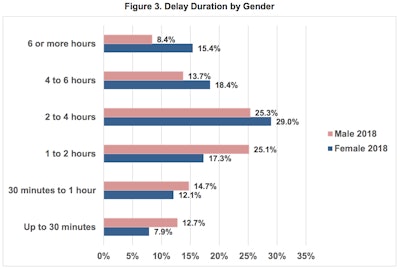According to a report from the American Transportation Research Institute (ATRI), drivers reported that nearly 10% of detention periods last six hours or longer. Women truckers, according to the survey of 1,900 drivers, were 83.3% more likely than men to be delayed six or more hours.
Men were detained more frequently than women up to the two-hour mark, but after two hours women were detained longer in every category assessed in ATRI’s research. Female respondents, about 250 of them, made up just more than 13% of the ATRI survey – about twice the percentage of female truckers on the highway.

That can be partially attributed to the fact that a higher percentage of women haul reefer freight – with more than a third of detention periods in the segment lasting four or more hours.
ATRI Vice President Dan Murray said followups with some of the female respondents revealed they didn’t see the delays as an issue of discrimination, but rather the patient nature of women in general causing them to be parked for longer periods.
“Very few of the women we interviewed felt that it was sexism at the dock, because in many instances dock workers saw the back of a trailer and had no idea who was in the cab,” he said. “If you look at our crash predictor report from this past spring, women were safer than men in every statistically significant category and I think that same sort of patience that we see at the docks which detain women longer is the same patience that makes them safer while they’re driving. That’s a theory of mine.”
Ingrid Brown, a reefer hauler and independent owner-operator and sole proprietor of her own company, Rollin’ B LLC, agreed that extended detention at the dock wasn’t a case of wide-spread sexism.
“When we pull in the driveway, unless it’s the guard shack that we check in with, they don’t know who’s driving the truck,” she said.
Brown suggested that female drivers, who tend to be newer to the industry with less experience overall, could be causing their own delays by simply not being ready when their turn comes.
“Why would they hold a female longer if it’s not another component?” she said. “Last week, I got loaded before four trucks got loaded because they didn’t follow protocol and I did. It was not a gender process there. That was a fact that nobody followed protocol. How many of those four thought, ‘It’s a female getting special treatment’? Do you realize how many guys think we get special treatment because we’re women?”
Deb LaBree, independent owner operator of Castle Transport and a Landstar lessee, took part in the survey and said she was surprised to see the disproportionate number of women enduring extended detention primarily, she said, because it’s rarely an issue for her.
“I never picked up on the fact that us women had more wait time,” said LaBree, who team drives with her husband. “I’ve been out here 12 years and I can count on one hand the times it has happened to me; where I have been treated different or ignored altogether.”
LaBree agreed that drivers unfamiliar with check-in and followup procedures are likely self-inflicting at least part of their own delays. She added that before her scheduled stops, mostly to pick up or drop off refrigerated pharmaceuticals, she’s already gathered as much information as she can to ensure she’s prepared before she ever approaches the dock.
“I know beforehand what my customer needs, so by the time I get there I’m ready,” she said. “I don’t have to be told to go over to the staging area … everything is in play when I get there.”
LaBree, also a senior administrator for the Women In Trucking Facebook page, added the topic of discriminatory detention has not come up in discussion online.
“I know in life there are some situations that women are being totally discriminated against,” she said. “I just don’t deal with a lot of it, and I’m not coming into contact with it. [Six-plus hour] wait times – I don’t care male, female or whatever – are totally not acceptable, but whether it’s a male/female issue I can’t say. I just think it’s a detention issue across the board.”
Both LaBree and Brown pushed back sightly at the notion that female drivers are more often delayed because they’re less likely than their male counterparts to get vocal at the dock.
“We’re a little more passive. We tend to be a little more patient [but] I’ve never had to fight for respect,” Brown said. “All I had to do was do my job. That was plenty enough.”
“I don’t stay quiet. I’m there to do my job. I stay professional, stay level headed and I get in line,” LaBree added. “Whether they like it or not they have to deal with me. I have their freight. The supply chain is a well-oiled machine. They have schedules. We have schedules. Putting me at the end of the line doesn’t benefit them when I have something they need.”
Being more aggressive at the dock, Brown said, can also backfire.
“I’ve witnessed guys get pulled a little further back for being a pain in the butt,” she said.
In any instance of wait time, LaBree said follow up is key, as is respectfully checking in and and asking for updates. However, she says there’s a difference in being passive and being respectful.
“You never want to make a nuisance of yourself,” she said. “You never want to yell or scream.”










